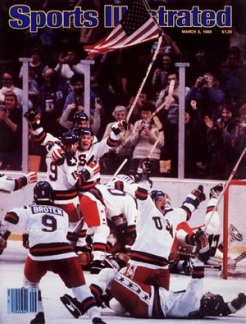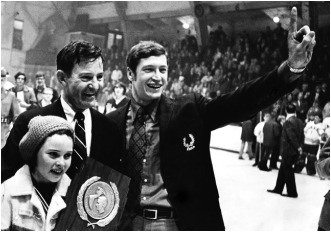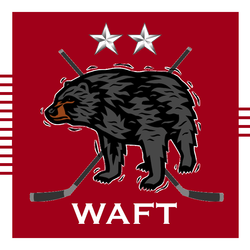Herb Brooks Arena would host the ECAC Semifinals and Finals for the 2013-14, 2014-15, and 2015-16 seasons. The capacity of the Arena is 7,700. The capacity pales in comparison to the capacities of Boardwalk Hall (10,500) and the Times Union Center (14,236) where the championship tournament has been held since it left Lake Placid in 2002. This is where perspective is important. The 2012 ECAC Championship game between Harvard and Union drew at most 4,131 in Atlantic City. The 2010 ECAC Championship game between Union and Cornell drew 6,505 in Albany. Both attendance values fit comfortably within the capacity that Herb Brooks Arena provides. The draw of the ECAC is not one that can presently demand that its league championship game be held in a venue like Madison Square Garden, especially when attendance values tend to plummet when Cornell and the Lynah Faithful are not involved. That is a reality. The ECAC may have begun in March 2012 to dispel rumors that it represents a sub-par brand of hockey with Union's Frozen Four appearance and Cornell's upset of Michigan, but it has not overcome its established history as a small draw. Concerns about the arena size are unfounded because the ECAC has not proven that it can fill an arena the size of Herb Brooks Arena. Furthermore, even if the ECAC begins to fill Herb Brooks Arena in the near future, a full medium-sized arena presents a better and more marketable image than the same volume crowd in a larger venue like Boardwalk Hall or the Times Union Center. The attendance capacity should be of little concern to ECAC fans generally and the Lynah Faithful in particular.
The recurring issue that has emerged and one that has been rumored to be an issue of contention among the few ECAC programs that did not approve of the move to Lake Placid is the fact that Herb Brooks Arena has an Olympic-sized ice sheet. Historically, the ECAC justified that playing on an Olympic-sized sheet was advantageous to the league members going on in the season because under previous iterations of the NCAA tournament venues with Olympic-sized sheets were included or even preferred for selection for NCAA tournament game sites. The change of the NCAA tournament structure to its current form eliminated this advantage. The NCAA selection committee now chooses venues that have NHL-sized ice sheets exclusively. The fact that the surface at Herb Brooks Arena is one different than those played on earlier in the season causes each program to adapt its game to a larger ice surface without any identifiable benefit in return.
Some who are more familiar with Herb Brooks Arena than I have stated that the locker room facilities are below the current standard level of facilities at the NCAA Division I level. I cannot speak to the accuracy of these statements, but the negatives with the venue seem to be limited to the ice surface and possibly the locker rooms. However, it must be noted that the Team USA U20 Development Program has been using the facility during the week before and weekend of this leak, and there have been no discernible complaints about the facilities even during the summer months. It appears that any shortcomings in locker room facilities in any respect during the ECAC's previous tenancy in Lake Placid have been addressed. The lingering issue is the ice surface size.
Some fans familiar with the ECAC's previous era in Lake Placid from 1994 to 2002 remember that the resort community was one that clung to its arcane hotel cancellation policies that made it difficult for fans who booked hotels before their teams advanced out of the first-round or quarterfinals of the ECAC Tournament to cancel their reservations at all or without severe penalty if the fans's team did not survive to the ECAC Championships. I was neither a Cornell hockey fan nor an alumnus during this era, so I cannot speak to how the hotel industry in Lake Placid functioned before the ECAC played its last tournament game in the resort town in 2002. However, a cursory inspection of most hotel sites with cancellation guidelines and policies indicates that hotels in Lake Placid, like many in the industry, have abandoned these practices and do not cling to the criticized practices any longer. The practices, platforms, and presence of hotels on online fora have changed markedly with the development of Web 2.0, an advent that has occurred since 2002, and it seems unreasonable to conclude that Lake Placid is behind the times until proven otherwise. It appears that the hotels in Lake Placid will not present such challenges to traveling members of the Lynah Faithful.
The relation between setting and television coverage has been discussed. The 2011 ECAC Championship Final between Cornell and Yale was broadcast on the hard-to-find CBS Sports Network. The 2012 ECAC Championship Final was covered on no major television-based platform. RPI TV did an amazing job with its coverage. It was higher quality than most college hockey games broadcast all season from any network. However, the ECAC needs national television coverage to build upon its recent national successes. While the Michigans and Notre Dames of the college hockey world can point to their coverage on the Big Ten Network and NBC Sports, the ECAC and Cornell cannot boast of any similar deals. Even for their championship series. Last season's coverage from RPI TV if syndicated to a national or regional network would have been an ideal situation. It would have demonstrated the accomplishments of a member school while celebrating the athletic programs of those competing. No matter the means, the ECAC must use the brand that is Lake Placid and Herb Brooks Arena to gain coverage of the ECAC Championship Final, if not the entire Championships series.
The now-defunct Empire Sports Network broadcasted the ECAC Championships when they were hosted in Lake Placid. Geographic seclusion would seem precluded as an argument against broadcasting from Lake Placid considering the success of doing such for the same tournament a decade ago. The MSG Network acquired the regional presence of the Empire Sports Network. MSG has high viewership in Upstate New York and broadcasts regionally specific programming through the year (Sabres coverage in Upstate New York, Rangers and Islanders coverage in Downstate New York). Its geographic footprint could broadcast it to the former market of the Empire Sports Network or decide to include the Downstate New York region as well where many alumni of ECAC institutions live and work. MSG claims that it enjoys covering college hockey and has respectable viewership numbers when it broadcasts the biannual BU-Cornell Red Hot Hockey games. This could be another event that it carries, even if it chooses to syndicate RPI TV's spectacular coverage or places it on a peripheral MSG Network station. The history of the Empire Sports Network in broadcasting the ECACs from Lake Placid, the greatest density of ECAC fans, the MSG Network market, and the branding of Herb Brooks Arena seems to support the conclusion that Lake Placid and Herb Brooks Arena should increase the likelihood that the finest teams of the ECAC face off against one another in the ECAC Championship Final in prime time.
The natural splendor of the host of the 1932 and 1980 Olympic Games scarcely can be overstated. The resort town sits in the shadow of Whiteface Mountain in the Adirondack Mountain Range. Many who can remember the ECAC Championships in Lake Placid remark about how the community focuses upon hosting an event of the caliber of the ECAC Championships. It is unfair to claim that Atlantic City neither focused upon nor catered to the ECAC Championships. The City was very welcoming and promotions were distributed widely within and without AC. However, there is an air about the ECAC Championships playing in New York State (the home of half of the ECAC member schools) and the winter feel of the Adirondacks in mid-March that makes Lake Placid feel more the appropriate setting for the ECAC Championships than Atlantic City. What sets Lake Placid and Herb Brooks Arena above the other interested communities and venues is history.
No American hockey fan needs explanation as to the significance of 1980, Lake Placid, and Herb Brooks. The players, including Cornell sophomore forward Cole Bardreau, at the Team USA U20 Development Camp during this leaked announcement, remark how amazing it feels to play on such a historic stage with such rich history. It was the ice on which an image was taken that inspired the only cover of Sports Illustrated that ran without caption. It is where a player from BU began the unthinkable and put the United States ahead of the Soviet Union, and endeared himself to many of the Lynah Faithful as shown with their thunderous applause at each Red Hot Hockey that Mike Eruzione attends.
Many worry that the appeal and emotion of the 1980 Olympic game between the Soviet Union and the United States is lost on the current generation of players and fans who were born well after the miracle. I am such a fan and I can attest that it is not. There is palpable excitement about watching a game in Herb Brooks Arena. Most of the 2010 Team USA hockey roster could not remember the 1980 miracle, but it rang no less significantly for them. Ours is the generation of Miracle, the film, not the event, but the ethos, legend, and investment is not lost on us. Herb Brooks and the 1980 team are more legend than men, and for this, perhaps we venerate Lake Placid, the coach, and the team more than even the generation who witnessed it because they have become truly larger than life.
It is for these reasons that Lake Placid will help recruiting, especially in the United States. It is a historic site. It is hallowed ground for American hockey. American athletes will thirst for the opportunity to hoist an earned and respected championship cup above their heads in the same arena where Jim Craig draped an American flag around his shoulders. Cornell's roster has become noticeably more American in recent years and this will help maintain Cornell's recruitment of American players to play on East Hill.
Some worry that the effect upon recruitment is overwrought for a league that recruits heavily in Canada. This oversimplifies realities. Objectively, Canadian hockey players know that a defeat of the Goliath that was Soviet hockey is significant and respectable. They need look only to their own defeat of the Soviet Union in the Summit Series to realize the importance for Canadian hockey culture. This misses noticeably the personal connection that many American players feel with the history at Herb Brooks Arena. Cornell stands advantaged in this respect.
Lake Placid hosted the ECAC Championships nine times. Cornell was 6-4-0 at Lake Placid over that span including winning the ECAC Championship twice under Schafer. However, those statistics are not the most salient point for a program that values its history so highly. It was in Lake Placid that John Hughes, Brian Cropper, and Ned Harkness completed the unprecedented and still unequaled feat of completing an NCAA Division I season undefeated and untied with a 6-4 win over Clarkson in 1970. Cornell players and Cornell recruited players of all national origins should feel a connection to the achievement of that goal in Lake Placid. Lake Placid is where the greatest miracle in United States hockey occurred and where Cornell hockey achieved a level of play to a level that no other program has attained.
The ECAC will make Lake Placid its home while Cornell will be home in Lake Placid already.





 RSS Feed
RSS Feed
